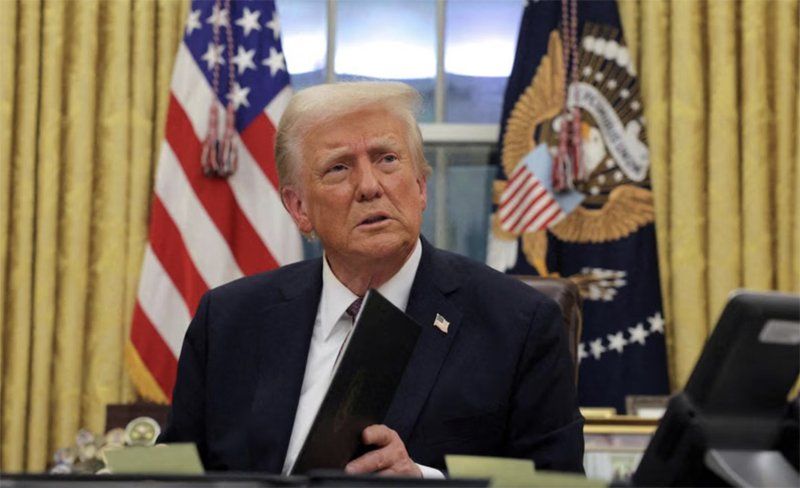Some conservative heavy-hitters are uniting against President Donald Trump's trade war.
The president lashed out last week against the Federalist Society, whose leaders helped him choose judicial nominations in his first term, but there's a rift developing between Trump and the conservative legal movement against his tariffs and other administration priorities, reported the New York Times.
“You have to understand that the conservative movement is now, as an intellectual movement, consistently anti-Trump on most issues,” said Richard Epstein, who teaches at New York University and is an influential libertarian legal scholar.
Epstein signed on to a friend-of-the-court brief filed in April by a coalition of prominent conservative and libertarian lawyers, scholars and former officials, including Federalist Society founder Steven Calabresi, former attorney general Michael Mukasey, and former GOP senators George Allen, John Danforth and Chuck Hagel.
“The brief unites big-name constitutional law scholars across the political spectrum in a way I have rarely seen,” said Ilya Somin, a law professor at George Mason University. “I never would have expected to see Richard Epstein, Steve Calabresi and [former Yale Law School dean] Harold Koh all on the same brief on a major issue. But here they are, together, opposing ‘taxation by proclamation.’ Donald Trump brought them together.”
Former federal appeals court judge Michael McConnell, a George W. Bush appointee, prepared the brief along with lawyer and historian Joshua Claybourn, and was filed in U.S. Court of International Trade.
ALSO READ: FBI silent as far-right podcaster demands Trump execution and Kash Patel torture
“The powers to tax, to regulate commerce and to shape the nation’s economic course must remain with Congress,” they argue in the brief. “They cannot drift silently into the hands of the president through inertia, inattention or creative readings of statutes never meant to grant such authority. That conviction is not partisan. It is constitutional. And it strikes at the heart of this case.”
The coalition filed a similar brief in another case in the Federal District Court in Washington, and the trade court ruled last Wednesday in favor of the challengers and the district judge did the same the next day, citing their brief eight times.
“Our hope is that the identity of the amicus parties will signal the gravity of the situation,” McConnell said. “All are concerned about executive usurpation of control over taxation of trade, which the Constitution explicitly vests in Congress."
An appeals court temporarily paused the trade court's ruling and will decide soon whether the extend that stay, and there's little doubt the case will reach the U.S. Supreme Court – probably soon – and the coalition's brief argues the judicial branch must reject Trump's executive actions as a violation of the Constitution's separation of powers.
“This case presents the court with a choice — not between competing trade policies, but between rival understandings of constitutional governance,” the brief argues. “One preserves the balance the framers struck, requiring that major economic decisions receive explicit legislative authorization. The other would allow the executive to unilaterally remake the nation’s commercial framework under vague and general statutory language never intended to support such action.”
“The court,” the brief adds, “should choose the former.”
Leave a Comment
Related Post
